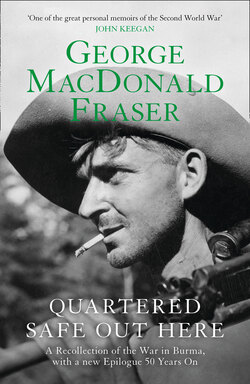Читать книгу Quartered Safe Out Here - George MacDonald Fraser - Страница 9
AUTHOR’S NOTE
ОглавлениеThe dialects of Cumberland are among the purest and, to the outsider, least comprehensible in the English-speaking world. Rendering them phonetically is difficult, but I have tried because that is the way my comrades talked, and to translate their conversation into normal English would be to change the characters of the speakers out of recognition; they were the way they spoke: tough, strong, forthright, and frequently aggressive. But while I hope I have conveyed their accent, I have to rely on meaning and context to suggest the style in which their speech was delivered. For example, the Cumbrian voice is well suited to derision; everyone knows the common English expression of disbelief, “Get away!” and the equally familiar North Country “Give over!”, meaning “Stop it”, but as rendered by the Cumbrian “Girraweh!” and “Give ower!” have respectively a snarling contempt and a violence which have to be heard. At its heaviest, the accent is a harsh, rasping growl, and it is this as much as the occasionally archaic vocabulary which baffles the foreigner. Just to give one quick example of pure Cumbrian, I give the translation of:
“Have you seen a donkey jump over a gate?” which is
“Est seen a coody loup ower a yett?”
That sentence, in Cumbrian, illustrates one of the most distinctive features of the county’s speech – the occasional use of the second person singular: “Est” or “Esta” is “Hast thou”. I emphasise occasional use; the Cumbrian, especially the countryman, will use “thou” (pronounced “thoo” or “tha”) and “you” or “ye” indiscriminately. “You will” in Carlisle may be spoken as “you’ll” or “ye’ll”, but out on the fellside it is liable to be “tha’lt” (“thou wilt”). Similarly, his assent may be “yes”, “yiss”, or “aye”; he alternates “well” and “weel”; “go” may be “gaw”, “gan”, or “ga”; he may say “how” perfectly normally, but he may also say “’oo”. The list is endless: “don’t” is usually “doan’t” or “dawn’t”, but occasionally it is “divvn’t” – and don’t (or divvn’t) ask me why.
I have said the dialect is pure, because it is both ancient and grammatical; Chaucer might well understand a modern Cumbrian better than he would a modern Londoner. But it has its antique ungrammatical lapses, too – “Ah’s” (“I is”) and “Thoo’s” (“Thou is”) are examples to balance against the purity of “Th’art” (“Thou art”) and “looksta” and “sista” (“lookest thou” and “seest thou”).
All of which may convince the uninitiated that my characters might as well be speaking Turkish; in fact, I don’t think their speech will be too difficult to understand, and where I think it may be I have appended footnote translations. The glossary at the end consists largely of Hindustani words and slang expressions current in the British Army fifty years ago.
G.M.F.
